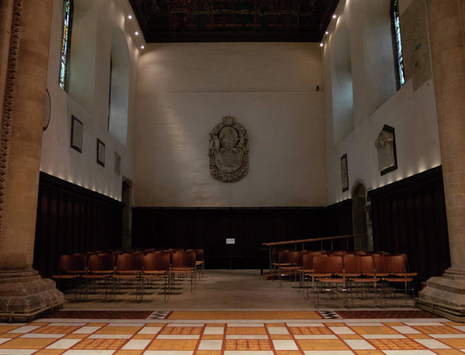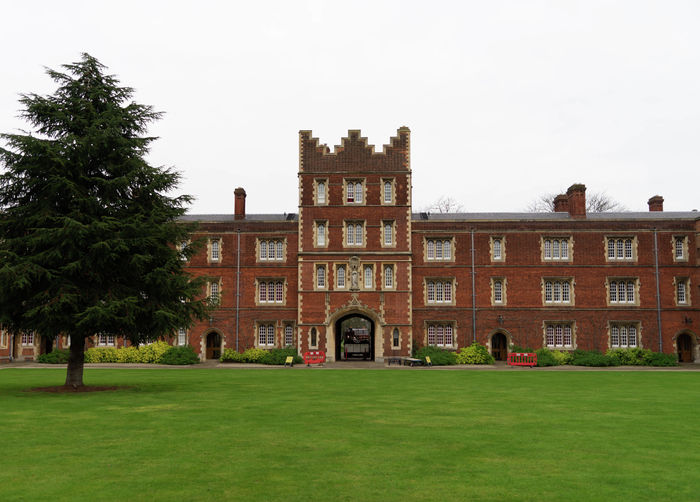Slaver memorial causes Jesus master ‘pain and discomfort’, court hears
Lawyers called the memorial an ‘abomination that causes offence’

The memorial of a slave trade investor that sits in Jesus College’s chapel causes the Master, Sonita Alleyne, “pain and discomfort”, a court heard today (4/2).
The lawyer representing the College, Mr Mark Hill QC, said that the memorial “turns her away” from “entering a Christian heritage she otherwise might want to pursue.” Adding that it serves as an “abomination that causes offence and provokes a response that affects well meaning individuals from entering [the chapel].”
The hearing centres on the memorial to 17th century slave trade investor and Jesus College donor, Tobias Rustat.
The College wants to move the memorial to a “more fitting educational space” where it can be “contextualised”, but since the chapel comes under the Diocese of Ely, Jesus has to get their permission before the memorial’s relocation.
However, alumni and Rustat’s descendants want the memorial to stay where it is, leading to a dispute in Ely’s consistory court which has been hosted in the Jesus chapel.
The hearing hinges on whether the chapel (a Grade I listed building) will be “harmed” if the memorial gets moved.
The College’s lawyer argued that with the memorial in its current place, the college community will be put off from coming to chapel. “The relocation of this memorial”, Mr Hill argued, “is necessary to make this a welcoming Christian community.”
The College wants the memorial to be moved to East House where it can sit as a “permanent educational exhibition.”
The two sides disagree as to the extent of Rustat’s involvement in the transatlantic slave trade.
Speaking for the opposition, Professor Lawrence Goldman of St Peter’s College, Oxford, argued that Rustat has been “assessed and judged incorrectly”, and that he is being “condemned for acts that were neither criminal nor exceptional at the time.”
Goldman noted that as a courtier and ally to King Charles II, Rustat was expected to invest in royal companies including the slave-trading Royal African Company (RAC).
The petitioners dismissed this, arguing for their part that there was “no doubt” that Rustat was “more active” than the average RAC shareholder, and was involved in the slave trade to a “high degree”.
For the opponents of the move a “retain and explain” approach should be followed.
Justin Gau, the lawyer representing them, said that the college’s push to move the memorial is akin to the “unfortunate desire to, as it were, get rid of an elderly and unpopular relative, though one who has been hugely generous in the past.”
“The best way to deal with a difficult relative is not to put them away but to live with them and learn from them”, he continued, arguing that relocating Rustat’s memorial to East House would hide his, and Britain’s, role in the slave trade.
Gau also pointed to the practical difficulties of shifting the 3.5 tonnes of marble, saying that it is “not something you unscrew from a kitchen wall.”
These arguments were roundly rejected by Hill, who pointed out that the “readily moveable” monument had been transferred from Rustat’s home in Chelsea, west London, to the college chapel, and later within the chapel itself.
As on Wednesday, the opposition accused Jesus of hypocrisy in light of the college’s ties to China, comparisons which the petitioners dismissed as a “smokescreen.”
The significance of the memorial’s position in a place of worship was also debated. Speaking on behalf of the petitioners, the college dean argued that having the memorial in the chapel “undoubtedly compromises” the work of the Church of England in furthering the gospel.
A former choral scholar at Jesus said that had he known more about Rustat’s role in the slave trade, he wouldn’t have applied to the colege.
Both sides delivered closing speeches just before lunchtime, and Judge David Hodge QC, who has overseen proceedings on all three days, said that he would deliver his decision in writing “as soon as I can.”
Jesus College released a statement onto its website this afternoon summarising its position: “Rustat is not being cancelled, erased or destroyed.”
“To the contrary, he will continue to be remembered in his final resting place in the Chapel, and elsewhere in the College – his name will remain prominently on the donors’ wall, and his coat of arms will remain in place in a window in the College.”
 Features / Are you more yourself at Cambridge or away from it? 27 January 2026
Features / Are you more yourself at Cambridge or away from it? 27 January 2026 News / Vigil held for tenth anniversary of PhD student’s death28 January 2026
News / Vigil held for tenth anniversary of PhD student’s death28 January 2026 Interviews / Lord Leggatt on becoming a Supreme Court Justice21 January 2026
Interviews / Lord Leggatt on becoming a Supreme Court Justice21 January 2026 News / Reform candidate retracts claim of being Cambridge alum 26 January 2026
News / Reform candidate retracts claim of being Cambridge alum 26 January 2026 Comment / How Cambridge Made Me Lose My Faith26 January 2026
Comment / How Cambridge Made Me Lose My Faith26 January 2026











